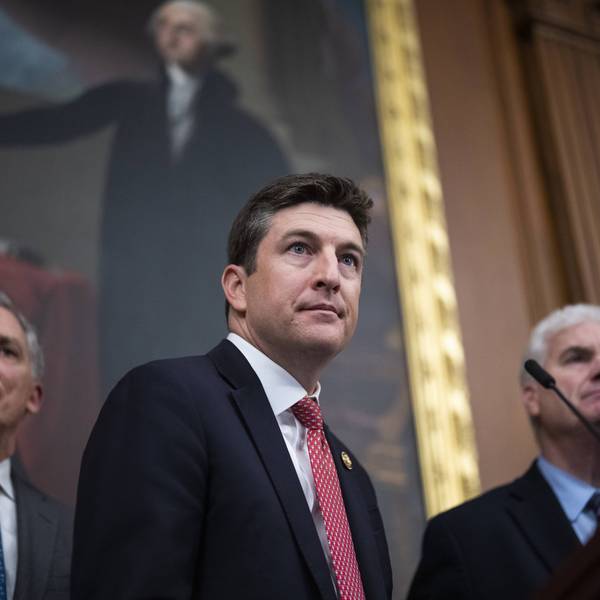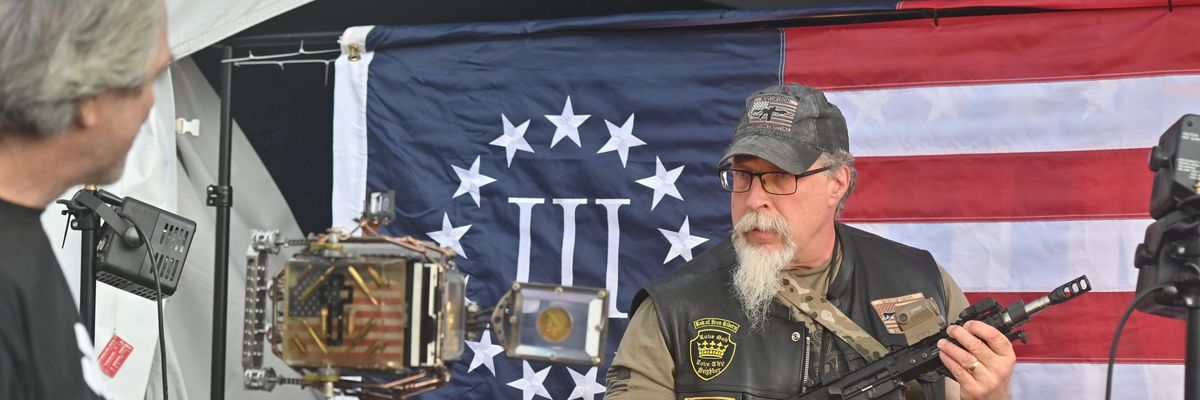The Supreme Court's disastrous rulings on prayer on public school property and abortion rights have finally focused proper attention on the role of religious extremism in undermining democratic self-rule. For decades, not only has it been underestimated, most of the media has misunderstood Christian fundamentalism's goals.
Make no mistake: the well-funded, well-armed alliance of motivated extremists that I have described constitutes the greatest domestic danger this nation has faced since the Civil War.
Katherine Stewart, who has written on the religious right for many years, has redressed this misunderstanding in a New York Times piece. She straightforwardly says that Christian fundamentalism's goal is "breaking American democracy," and that this is not an unintended byproduct of fundamentalism's political activity. No, it "is the point of the project."
From my former staff position in Congress, I observed the infiltration of the Republican Party by the religious right. In particular, I became alarmed at the shadowy undertakings of GOP congressman belonging to "the Family," a secretive group that believes in imposing theocracy on America. Having left the Hill partly as a result of what I saw as the religious right's subversion of the Party of Lincoln, I've spent the last decade attempting to warn the public about the existential danger the GOP poses.
Based on my own experience, I have no disagreement with Ms. Stewart's thesis. I do believe she may have understated the danger by the fact that her analysis is incomplete. While accurately evaluating the movement, she did not explain how it leverages tactical alliances with other, disparate groups that at first sight seem to have little in common with Christian fundamentalism.
There is another group associated with "nationalism" that is much in the news: white nationalists, including the Proud Boys, Oath Keepers, neo-Nazi groups like Richard Spencer's blandly named National Policy Institute, the Aryan Nation, and similar groups. At first sight, Christian fundamentalists and white nationalists seem to have little in common: what do self-described sober, church-going Christians have to do with a violent rabble of criminal misfits?
First, there is a substantial overlap in membership, as strange as this might sound. In recent decades, many Christian nationalist leaders have begun obsessing over "taking back America" by any means necessary, including violence. This is unsurprising, because fundamentalist Christianity broods over violence and mayhem as a theological tenet, emphasizing the gorier parts of the Old Testament such as the Israelites' mass slaughter of the Canaanites.
The very focus of dispensationalist sects is Armageddon, an imaginary genocidal event that destroys most of humanity--something the dispensationalists say they look forward to. This violence-courting mindset has degenerated into the trash cultural phenomenon of the Ultimate Fighting Jesus.
Almost two decades ago, the evangelical community was already rapturous about Mel Gibson's "The Passion of the Christ," wherein brutality reached pornographic levels of sadomasochism and the resurrection was an afterthought. Acceptance of mass violence as a cataclysmic ushering in of their desired society is now infused into the religious right in much the same manner as it is among white supremacists.
The irony of this is that many white nationalists are either nonreligious or explicitly pagan (like Aryan Nation and the various neo-Nazi groups). Yet they and the Christian nationalists bury their extreme theological differences to ally against their common enemy: the Enlightenment, a tolerant society, and equal justice under law.
If one still thinks of white supremacists as a not very numerous lunatic fringe, their nearly successful attempt to violently overthrow the government should dispel any illusions. As such, they may act as shock troops for a movement of millions of people. And let us not forget the grotesque irony that many January 6th rioters piously paused to pray before seeking to hang the vice president and the speaker of the House; the fact that a pagan shaman was also on hand seemed to seal a bizarre alliance.
Other strange fellow travelers of the Christian fundamentalists are the extreme libertarians. It has been said that libertarianism is the peculiarly American form of authoritarianism; it is often a label used by people to disguise, for tactical reasons, the fact that they are de facto Republicans. These libertarians are frequently the paymasters of Republican politicians (as evidenced by Peter Thiel, the Koch fortune, the Mercer family, et al.), and as such, wield outsized influence over the GOP.
Peter Thiel's philosophy boils down to saying that your moral worth equates to how much money you have. His notions dovetail nicely with Christian fundamentalists who espouse the Prosperity Gospel, the claim that one's wealth is a sign of God's favor. Both libertarianism and fundamentalism have more similarities than differences in their hostility to a liberal, tolerant society with a social safety net. Rich libertarians reason that they can buy their way out of any inconvenience that an intolerant theocracy might entail, like no social services or a rotting infrastructure.
Many libertarians such as the Randian Objectivists are dismissive of religion. Ayn Rand herself was a militant atheist who regarded Christianity as the creed of slaves. But like the white supremacists, they feel they have more in common with Christian extremists than a liberal, secular society that might presume to tax them and regulate product safety or insure against the vicissitudes of old age or disability.
What unites all these seemingly disparate ideological groupings is an authoritarian outlook that inevitably tends towards fascism. Almost 30 years ago, the Italian author Umberto Eco wrote an essay called Ur-Fascism in which he described the salient characteristics of fascism. It was, he said, a difficult subject to pin down because fascism is so mutable according to time and place.
Some of the tendencies of historical examples of fascism seem irrelevant or even contradictory to other tendencies. But he explained this by saying that fascism's power derives from being syncretic: it gathers together pretty much every retrograde belief, even when they are inconsistent with one another, and molds them into an action-oriented movement to every kind of authoritarian person in a society.
Among these tendencies is a fascination with violence. Fundamentalists and white nationalists have this in common, but there is a powerful strain in American libertarianism that rejects public safety or gun control as the nanny state and extols "live free or die," a philosophy that in practice confers power on any group that is armed and willing to use force.
Also present in Eco's Ur-Fascism thesis are misogyny and the cult of masculine toughness. This is obvious among fundamentalists and white nationalists alike: Southern Baptists and other evangelical sects preach "submission" of women, and every nationalist movement of the past century has diminished women's rights. As with Mel Gibson's cinematic efforts and the bizarre activities of some far-right groups, this cult of masculinity becomes so embarrassingly Freudian that it equates to effeminacy.
Many libertarians are also dismissive of women, taking the social-Darwinian view that feminine weakness and sentimentality are a drag on a tough, realistic society that looks out for Number One and regards the poor as social parasites. Thiel has expressed his despondency over the fact that women have the vote.
Also characteristic of the three groups is a nostalgic fixation on an imaginary past that Eco describes as a feature of generic fascism. For fundamentalists, it is a universally Christian America that supposedly existed, objections from Thomas Jefferson, James Madison, Mark Twain, or Ambrose Bierce notwithstanding. White nationalists pine for a traditional white America, regardless of the presence from the beginning of racial differences and tensions. For libertarians, a utopian past is one in which 13-year-old boys work in coal mines and their adolescent sisters toil 12 hours a day in cotton mills.
For libertarians, a utopian past is one in which 13-year-old boys work in coal mines and their adolescent sisters toil 12 hours a day in cotton mills.
Eco delineates other ur-fascist tendencies these three groups share: a faux-populism coupled with a railing against "elite" straw men; the habit of using a vocabulary similar to Newspeak in that it hides meaning rather than reveals it; contempt for the weak; and more.
Now that the Supreme Court has seen fit to read theocracy into the Constitution, Americans have begun to wake up to the political threat to their liberties and their way of life. But few have noticed how synergistic the rest of its rulings are with a religious-right campaign to wreck the constitutional order. Past campaign finance and congressional redistricting decisions have been a gift to a party that has given up on competitive electoral democracy in favor of Russian-style elections and public religion enforced by state diktat.
The Court's decrees on firearms are an open season for violent extremist groups that endangers the rest of us. (Ironically, and contrary to the Republican court majority's own sanctimonious preaching about the utility of guns for personal self-defense and Samuel Alito's explicit denial of a constitutional right to privacy in the abortion case, the GOP justices are hypocritically demanding that Virginia and Maryland taxpayers provide them with armed security because protesters are disturbing their privacy).
Have we seen any evangelical Christian sect commonly associated with the religious right take a stand against gun violence? No--what ever happened to their alleged reverence for life? The U.S. Conference of Catholic Bishops does a little better in its position against gun violence, but its stand for firearms safety is practically invisible to the public compared to its relentless and high-profile lobbying against women's reproductive rights.
Now that the Supreme Court has declared war on secular society, lesser tribunals have taken the hint. A chancery court in Tennessee has dismissed the lawsuit of a couple claiming that a state-sponsored Christian adoption agency refused to help them because they are Jewish. What makes the case egregious is that although the adoption agency was private, the adoption process was taxpayer-funded, and the couple had been state-approved. If the ruling stands, the adoption agency might as well post a sign in front of its building reading Juden unerwunscht (Jews not wanted).
Many Americans, the moderately religious and secular alike, react to any discussion of religion with a kind of frozen embarrassment, feeling that theological matters, like sex, are private subjects not suited for public airing or social dialogue. They also probably absorbed as children that it's "not nice" to be seen as criticizing someone's religion. Their hesitancy to enter the fray leaves the political field open for agenda-driven zealots to impose their narrow, intolerant prejudices on the rest of us.
Make no mistake: the well-funded, well-armed alliance of motivated extremists that I have described constitutes the greatest domestic danger this nation has faced since the Civil War.




